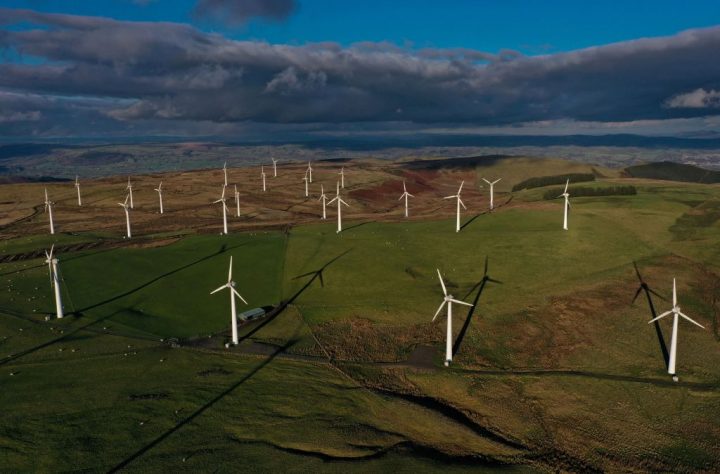When it comes to renewable energy, the ambitions of recent Conservatives have verged on the superlative: from one prime minister’s infamous pledge to turn Britain into the ‘Saudi Arabia of wind power’ to a seemingly exponential explosion of green jobs across the country (half a million by 2030, according to Grant Shapps). The green transition has launched quite the rhetorical arms race.
Can the UK really emerge as a world-leader in renewables? That was the question on the agenda as The Spectator convened a panel of experts, industry voices and politicians at this year’s energy summit. It was time to get beyond the bluster and shine some light on that all-important question: just how realistic were the government’s ambitions to secure hundreds of billions in investment for its energy transition?
What’s the sense in claiming to be the Saudi Arabia of wind power when you are still importing the turbines?
‘I think the UK obviously has some fantastic advantages,’ said David Whitehouse, chief executive of the industry body Offshore Energies UK (who sponsored the discussion). ‘We have obvious advantages like the wind and the reservoirs. But I think the most important thing is that we also have the people and skills. And many of those are already working in our current energy sector, including with oil and gas.’
For the Offshore Energies UK and its members, this was the crucial factor for the green energy transition: the importance of utilising the existing energy industry as a potential driver for the green transition. ‘When it comes to that transition, collaboration is key,’ said David Whitehouse. ‘That includes collaboration between the government and industry, but also between different sectors within that industry.’
So where were the opportunities for that collaboration? For Sian Lloyd-Rees, the UK head of Mainstream Renewable Power, one obvious example was the development of floating wind farms – an industry widely touted as the next evolution of wind power. ‘The technology in that market is very different to the current generation of offshore wind,’ she said. ‘But the oil and gas sector already has expertise in things like deepwater floating units and subsea dynamic cabling’. That gave the UK a clear opportunity to secure first-mover advantage.
Was the government ready to seize that prize? In 2021, the former Department for Business, Energy and Industrial Strategy had published its North Sea Transition Deal: a detailed commitment to harness the skills, jobs and supply chains from the existing oil and gas industry in delivering the great net zero transition. As both government and industry had made clear, though, achieving this would depend on the UK’s ability to bring in outside investment. And on that point, the stakes had just been raised even higher.
‘President Biden’s Inflation Reduction Act has initiated a period of real international competition when it comes to attracting investment,’ said Nick Butler, a former Downing Street advisor (under Gordon Brown) and now a visiting professor at King’s College London. ‘It is essentially a protectionist move against China. But it will have consequences for the UK too, meaning we need to be very strategic as to where we put our investment.’
How is the UK doing on that front? ‘I think we started off extremely well,’ said Sian Lloyd-Rees, pointing to the much-praised contracts for difference scheme which had helped to de-risk investments in wind power and, more recently, hydrogen. ‘Where we have failed in my opinion is attracting inward investment for the underlying supply chain.’ This was particularly pertinent in the current high-inflation environment, where companies had been left at the mercy of rising costs for things like wind turbines.
Our chair Kate Andrews turned to one of the most commonly cited hurdles: the controversial windfall tax. Now approaching its second anniversary in operation, the levy had become the subject of increasingly vocal criticism from the energy industry. Yet far from retreat, the Conservatives had seen fit to raise the levy in their last Budget. With energy prices finally set to come down, was it now time for a rethink?
‘I personally held out against a windfall tax for a long time,’ said Conservative MP Peter Aldous and chair of the APPG for the UK’s oil and gas energy industry. ‘I think it is understandable when companies are making such large profits, but it should fall away when they aren’t doing so,’ he added. Perhaps it could be revisited, he suggested (no doubt to many in the room) in the government’s autumn fiscal statement.
Energy economist Nick Butler took a different line. ‘The current windfall tax is based on profits, rather than revenues,’ he said, meaning that companies would pay less this year anyway. ‘I think the bigger issue is the lack of certainty around long-term energy policy.’ When investors were considering making a long-term commitment – whether that be a new wind farm or a North Sea oil field – they needed to be able to assess their potential returns over the decades, rather than months and years.
For David Whitehouse, there was also a need for Whitehall to be more realistic in its long-term assessment of the UK’s energy needs. ‘Even under the best scenarios for 2050, the UK will still be getting around 25 per cent of its overall energy needs from oil and gas,’ he said. By failing to guarantee a future for the sector, the government was raising the risk that the UK would have to add to its emissions by importing those needs from elsewhere.
In the era of trillion-dollar climate summits and calls to ‘Just Stop Oil’, it might not be the most fashionable message – but it was one that the Conservatives needed to wake up to. After all, as Nick Butler suggested, what sense was there in claiming to be the Saudi Arabia of wind power when you are still importing the turbines?






Comments